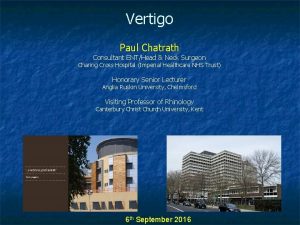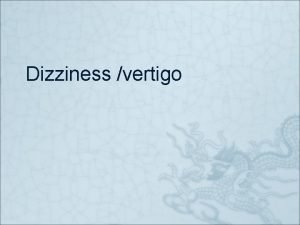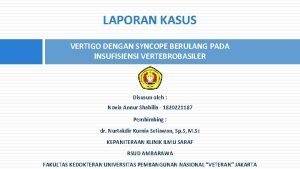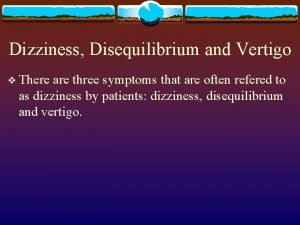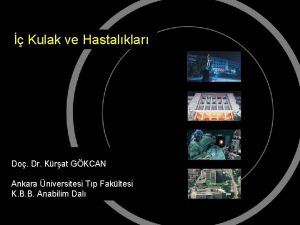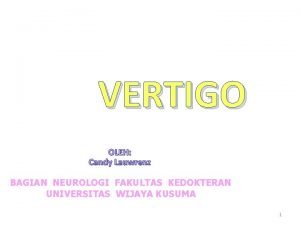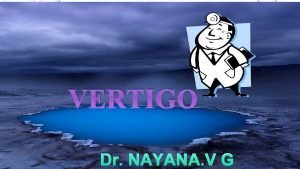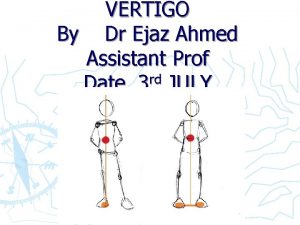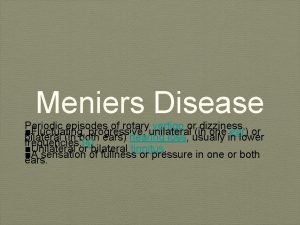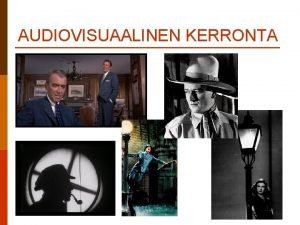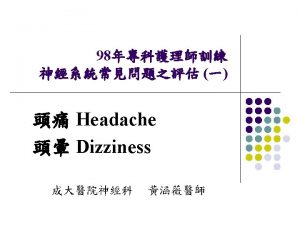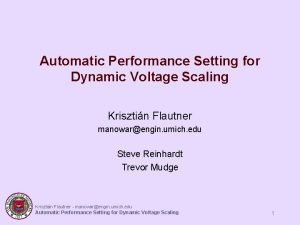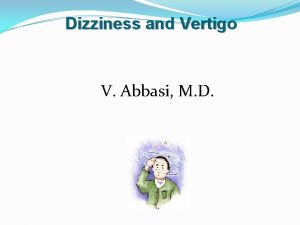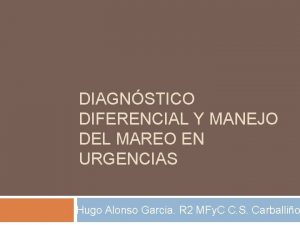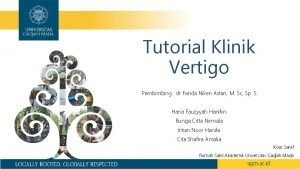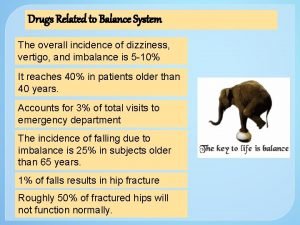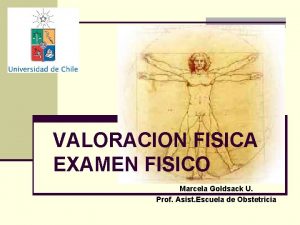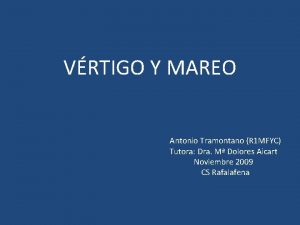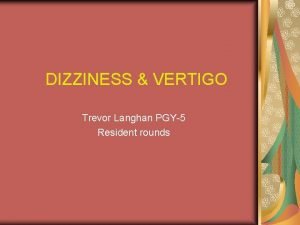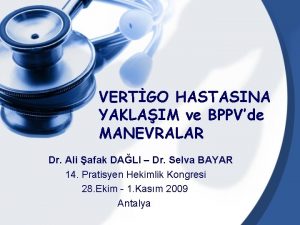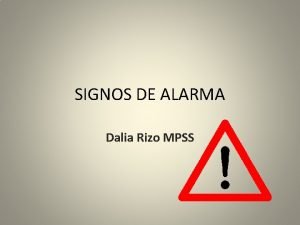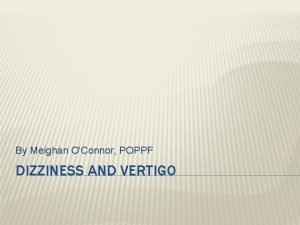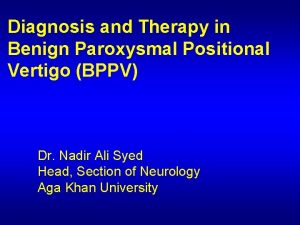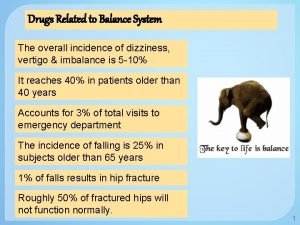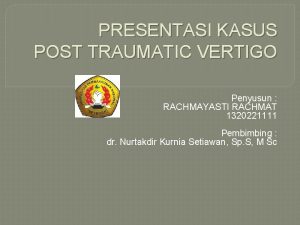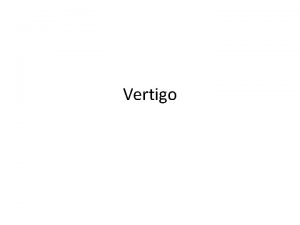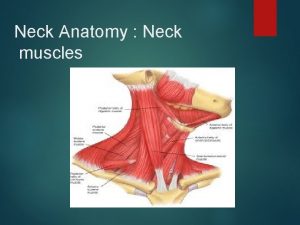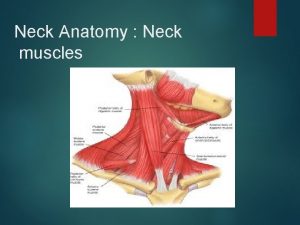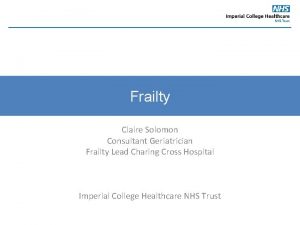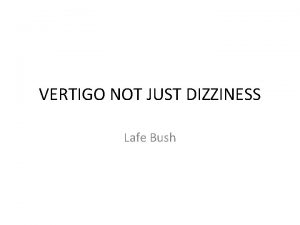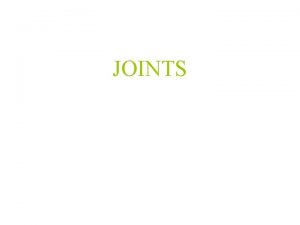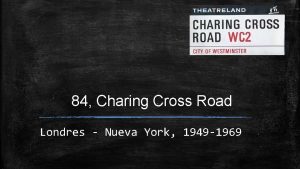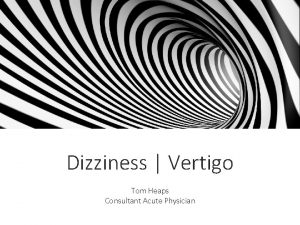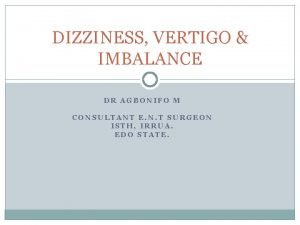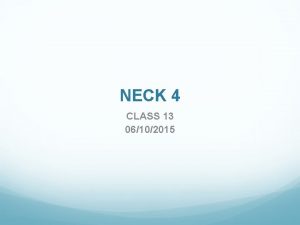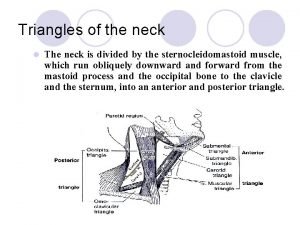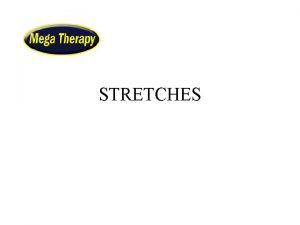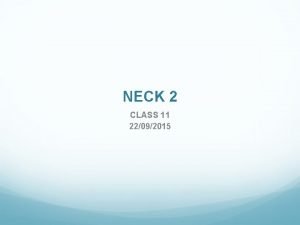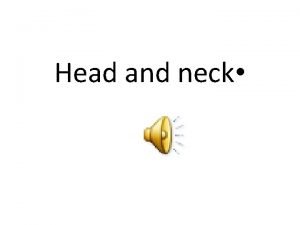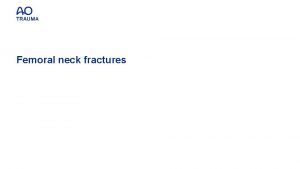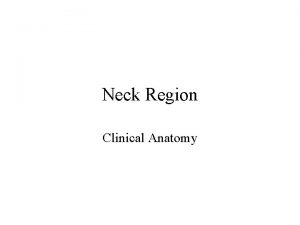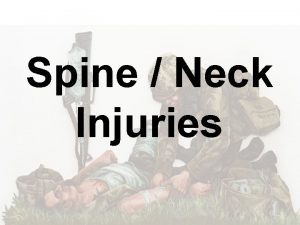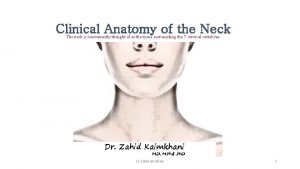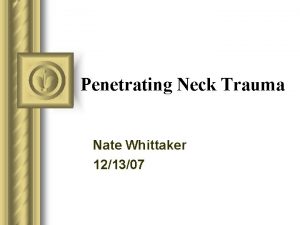Vertigo Paul Chatrath Consultant ENTHead Neck Surgeon Charing




























- Slides: 28

Vertigo Paul Chatrath Consultant ENT/Head & Neck Surgeon Charing Cross Hospital (Imperial Healthcare NHS Trust) Honorary Senior Lecturer Anglia Ruskin University, Chelmsford Visiting Professor of Rhinology Canterbury Christ Church University, Kent 6 th September 2016

Objectives n n Dizziness / vertigo in general ENT causes for vertigo n n n Meniere’s BPPV Labyrinthitis n n Other ENT causes of dizziness ‘red flags’

Case - Dizziness n n n Please see this 40 year old female suffering with short lived episodes of vertigo Occurring almost daily Occurs whenever moves head in any direction

Clinical approach n Vertigo vs dizziness n Vertigo Rotatory n Suggests a peripheral vestibular or cerebellar problem n n Dizziness / lightheadedness n Non-specific n n ‘whoozy’ ‘ lightheaded’ ‘unsteady’ ‘drunken’ Suggests non-vestibular pathology

Types of Dizziness Rotation (Spinning) Unsteadiness (Imbalance) Light headedness (faint feeling) If the patient has ever lost consciousness: it is not ENT!

Vertigo - causes Vestibular n n n n Viral labyrinthitis BPPV Meniere’s disease Acute Otitis Media Trauma Cholesteatoma Drug induced Postsurgical Central n n Migraine Vertebrobasilar ischaemia MS Tumours n Cerebellopontine angle n n n Acoustic neuroma Brainstem CVA Psychogenic

Non-specific dizziness: Causes n Cardiovascular n n n Arrhythmias Reduced cardiac output Carotid artery stenosis Arteriosclerosis Hypotension (postural) Peripheral neuropathy n n n Proprioception n n Arthritis (cervical and other) n n DM Hypothyroidism Hypercholesterolaemia Anaemia n n B 1, B 6, B 12 Genetic - Refsum’s disease Toxins n n Leprosy, TB, syphilis Vitamin deficiencies n Metabolic n DM Renal or hepatic failure Alcohol Vasculitis Infections Lead, metronizadole Psychogenic

Vertigo: Duration is key n Brief (<1 min) BPPV n Psychogenic n n Hours Meniere’s n Migraine n n Days (>24 hrs) n Viral labyrinthitis BPPV Psychogenic Meniere’s Migraine - specific head movement - any head movement - classic triad - classic headache

Nystagmus n Movement of the eyes: n n Rhythmic Oscillating Synchronous Involuntary n Two phases n n n Slow phase (pathological) Fast phase (corrective) Direction described in terms of fast phase

Nystagmus Normal labyrinths Abnormal Right Labyrinth R L Eyes central L X Slow drift to right Rapid corrective flick to left = Left nystagmus

Vertigo: Compensation n n Vestibular phenomenon Steady accommodation to the effects of vertigo Gradual resolution of symptoms over time Typically occurs 6 -12 weeks after acute insult n Mechanisms n Habituation n Reduced output good side Increased output affected side Sensory substitution n Increased reliance on eyes and musculoskeletal system

Vertigo: Compensation n Impaired compensation due to: n n n Poor visual acuity Musculoskeletal problems Reduced peripheral sensory input Ongoing vestibular pathology Medication (prolonged stemetil) n Rehabilitation: n General fitness n n Physical programs n n n Vision, walking stick Cawthorne-Cooksey Psychological support Specific exercises n Eg. Brandt-Daroff exercises for BPPV

Vertigo: Vestibular v Central Vestibular Central Type of dizziness Vertigo / Dizzy Effect of head movement Worse Equivocal Tinnitus/hearing loss May be present Absent Compensation Occurs Does not occur Nystagmus Horizontal + unilateral + away from affected ear Horizontal or vertical + bilateral

Vestibular rehabilitation: Cawthorne - Cooksey n n n Head movements Balance tasks Coordination of eyes with head Total body movements Eyes open & closed Noisy environments Causes early exacerbation of vertigo

Caution: Prochlorperazine n n Powerful vestibular sedative Suppresses acute vertiginous symptoms BUT Also suppresses natural compensatory response LT use: ‘non-specific dizziness’persists

Psychogenic n n n Type of dizziness: any (nonspecific or vertigo) Frequency: constant Duration: Typically brief <1 min Trigger: Stress, anxiety, crowds Associated features: palpitations, sweating, tremor Examination: Normal

Labyrinthitis n History n Vertigo n n n >24 hrs Vomiting Constitutional symptoms Usually following URTI n Treatment n n Examination n Nystagmus n n Fast phase away from affected ear Pyrexia n Bed rest Vestibular sedatives Fluids Cawthorne-Cooksey vestibular rehabilitation exercises Rule of threes - 3 days: v bad, 3 weeks, a lot better, 3 months resolved

Meniere’s Disease n Key features: n Vertigo n n Tinnitus/hearing loss n n Before/during/after vertigo Other symptoms n n n Hours Pressure feeling Nausea Natural history n n n One episode Episodic Increasing frequency n n n Salt restriction Diuretics - thiazides Vasodilators n n Betahistine, cinnarizine Evidence – no RCTs n n Cinnarizine > placebo Diuretics = placebo Serc of marginal benefit Salt restriction of marginal benefit

Intratympanic therapy: Steroids or Gentamicin

BPPV: Benign Paroxysmal Positional Vertigo n n Calcific debris in semicircular canals Vertigo n n n Brief (<1 min) On head turn in a particular direction Typically self-limiting Primary Secondary n n Trauma (HI) Prolonged bed rest Otological condition (up to 70%) Posterior SCC n n In plane on lying in bed Hallpike’s test n Nystagmus on lying back to one side

BPPV - Epley, 1992

BPPV - Brandt & Daroff, 1980

Migraine n Clinical features n n n Lifestyle change n n Family history Motion intolerance Vertigo occurs with classical headache either before or after ENT/vestibular examination usually NAD Exercise, diet, avoidance of stimulants Medication: n n Abortive therapy eg. Sumatriptan Prophylactic therapy eg. B blockers

Other ENT conditions causing dizziness n Ear: Malignant OE n Otitis media n Cholesteatoma n n Nose/Sinus n n Sinusitis Thyroid disturbance

Dizziness/Vertigo: Indications for Urgent Referral n Vertigo n n n Intense Disabling Unremitting Nystagmus Sudden SNHL n Features to suggest malignant pathology n n Elderly with granulation in ear canal VIIn palsy Post-traumatic TM perforation + vertigo

Conclusion n Must define the dizziness / vertigo n n Rotatory or not Frequency Triggers History is the most important factor n Duration n Vertigo n n n BPPV (cervical / psychogenic) Meniere’s (Migraine) Labyrinthitis (Drug / multifactorial) ENT causes for vertigo When to refer urgently

Case n n n Please see this 40 year old female suffering with short lived episodes of vertigo Occurring almost daily Occurs whenever moves head in any direction

Vertigo Paul Chatrath Consultant ENT/Head & Neck Surgeon Charing Cross Hospital (Imperial Healthcare NHS Trust) Honorary Senior Lecturer Anglia Ruskin University, Chelmsford Visiting Professor of Rhinology Canterbury Christ Church University, Kent paul. chatrath@nhs. net 6 th September 2016
 Vertigo vs lightheaded
Vertigo vs lightheaded Dear ate charing letter
Dear ate charing letter Meniere's disease vs bppv
Meniere's disease vs bppv Status neurologis
Status neurologis Diagnosis topis vertigo
Diagnosis topis vertigo Vertigo causes
Vertigo causes Site:slidetodoc.com
Site:slidetodoc.com Dr candy lauwrenz
Dr candy lauwrenz Romberg test
Romberg test Kode icd 10 otalgia
Kode icd 10 otalgia Tawassol prof
Tawassol prof Tipos de vertigo
Tipos de vertigo Labrynthectomy
Labrynthectomy Audiovisuaalinen kerronta
Audiovisuaalinen kerronta Baep
Baep Faster dynamic voltage scaling
Faster dynamic voltage scaling Vertigo
Vertigo Vertigo sintomas
Vertigo sintomas Normosefali
Normosefali Vertigo
Vertigo Examen físico segmentario
Examen físico segmentario Vertigo periferico
Vertigo periferico Peripheral vs central vertigo
Peripheral vs central vertigo Tulio fenomeni
Tulio fenomeni Brudzinski signo
Brudzinski signo Poppf
Poppf Canalith repositioning
Canalith repositioning Vertigo
Vertigo Diagnosis topis vertigo
Diagnosis topis vertigo
